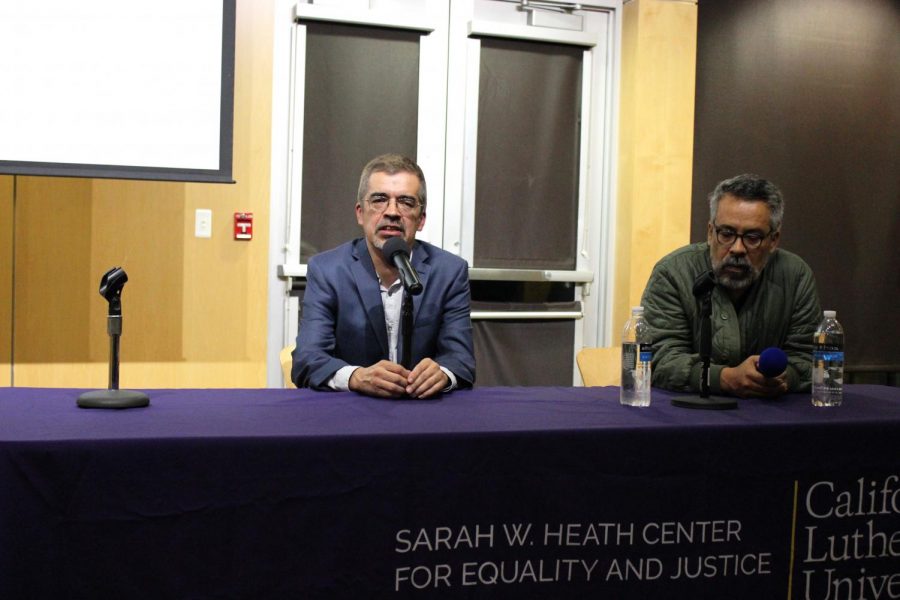Alvaro Huerta and Salomon Huerta: Defending Latina/o Immigrant Communities
Photo by Maria Barragan- Reporter
Disrupting negative connotations: Brothers Alvaro Huerta (left) and Salomon Huerta (right) were panelists at Cal Lutheran Thursday, Nov. 14.
November 17, 2019
Alvaro Huerta, joined by his brother Salomon Huerta, gave a lecture panel on Alvaro Huerta’s book “Defending Latina/o Immigrant Communities,” while discussing their professional experiences as educators and artists on Thursday, Nov. 14 in Lundring Events Center at California Lutheran University.
Salomon Huerta’s art is being exhibited at the Kwan Fong Gallery of Art and Culture at Cal Lutheran from Nov. 1, 2019 to Jan. 3, 2020.
Salomon Huerta said his aim is to disrupt negative connotations of the Latinx community by using real-life and non-violence related narratives. His art work is currently featured at the Louise Alexander Gallery in Los Angeles, California and in Porto Cervo, Italy.
Alvaro Huerta is a professor at California Polytechnic State University, specializing in Urban Planning, Ethnic and Women Studies. During the event, Alvaro Huerta described his experience growing up as a Latino and what his narrative throughout his book was intended to showcase.
“When you identify a problem, how you frame it and how you identify it is going to determine how you solve it. This is important because the book is about immigration and it is about defending immigrants, and it’s about defending immigrants without apologizing, because no one is illegal, no human being is illegal,” Alvaro Huerta said.
Alvaro Huerta said the negligence that many Latina/os feel today as certain politicians classify them under negative narratives has become front and center in his work.
“Let’s not fool ourselves here. You can be a Democrat, you can be a Republican, you can be black, or you can be orange, it doesn’t matter to me. What matters is the policies. What policies you are implementing. So if you’re deporting brown people, Asian, Pacific Islanders and others, to me that is the problem regardless of your race,” Alvaro Huerta said.
Aliyah Gardea, student coordinator for the Sarah W. Heath Center for Equality and Justice, spoke about the importance of showcasing Latin related events on campus.
“It was just really heartwarming to see that a lot of people came out for this issue, because I know it’s something that is very important for a lot of people, but sometimes it does feel [like] there is a lack of representation on this campus for things like that,” Gardea said.




















